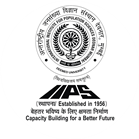- About IIPS
- Academics
- Study @ IIPS
- Departments
- Centres
- Controller of Examination
- Programme
- Distance and Online Education
- Training
- Facilities/Services
- Resources
- Virtual Learning
- Digital Initiatives (MHRD)
- Notice
- Seminars / Workshops / Conferences
- Conferences
- Publications
- Seminars
- Sponsored Research
- Workshops
- Collaboration
- National
- International
- NEP 2020
- Admission
- Courses
- Admission Bulletin
- TIME-TABLE For Admission 2025-26
- Model Question Papers
- Programme Coordinators
- Fellowships
- Academic Calendar
- International Students
- Visa Information
- Administration
- Faculty & Staff
- Research & Publications
- Library
- Information
- Right to Information
- Vigilance Officer
- Annual Report
- Director's Report
- Cells & Commitees
- Cells
- Commitees
- Committees of NEP 2020
- Staff Walfare Committee
- Cultural Committee
- Internal Committee
- Purchase Commitees
- Students Academic Committee
- Student Research Ethics Committee
- Anti-Ragging Committee
- Institutional Review Board
- Social Media Committee
- Prevention of Caste-based Discrimination Committee
- Code of Conduct and Professional Ethics
- National and International honours, Awards, Recognition, and Medals
- Online Facilities
- Employee's Corner
- Memorial Lectures
- Convocation
- IIPS Newsletters
- COVID 19 Information
- Life @ IIPS
How Chronic Diseases Impact Healthy Ageing Outcomes among Older Adults in India
- Home
- How Chronic Diseases Impact Healthy Ageing Outcomes among Older Adults in India
Abstract Content (not more than 300 word, should include: Introduction, Objective, Methodology, critical findings & Conclusion):
Introduction:
World has seen dramatic increase in life expectancy. People can expect to live life beyond 60. But are they living in healthy state is the question, i.e., Healthy Ageing. WHO focuses on functionality of older adults rather than the presence or absence of diseases. Factors which help to identify it are ADL, IADL, Cognitive skills, social participation etc.
Method:
This paper makes an index of healthy ageing by taking various dimensions of health namely, functional ability, intrinsic capacity and social participation of people above the age of 60. These factors are recognized as key contributors to an individual’s overall health. Furthermore, this paper examines how chronic diseases impact our index, to see its influence on functioning and well-being. LASI, wave 1, is used to create the index using the composite index methodology. The index has 49 variables divided into the three domains, and the final scores were divided into three categories, with the lower category indicating poorer outcomes. The Cronbach's alpha was 0.88. Furthermore, we used multinomial logistic regression (middle category: reference) to examine influence of 10 chronic conditions on achieving different levels of healthy ageing. The analysis controlled for socio-economic factors like sex, religion, caste, education, working status, and place of residence.
Results:
Chronic conditions like angina, stroke and psychological disorders significantly increase the odds of being in category 1 (lowest healthy ageing scores). For category 3 (highest healthy ageing scores), diabetes, hypertension, and COPD significantly decrease the odds of scoring higher.
Discussion and Conclusion:
These findings highlight the critical role of socio-demographic and health factors, offering insights for future research by focusing on diseases that significantly impact healthy ageing outcomes and exploring interventions to mitigate their effects.
Abstract theme:
In case of not been selected for oral presentation, do you want to be considered for the poster presentation ?:
Yes
Do you require financial support to attend the seminar ? (Not applicable for virtual meet):
Yes-full
Gender:
Female
Evaluation Status:
No
